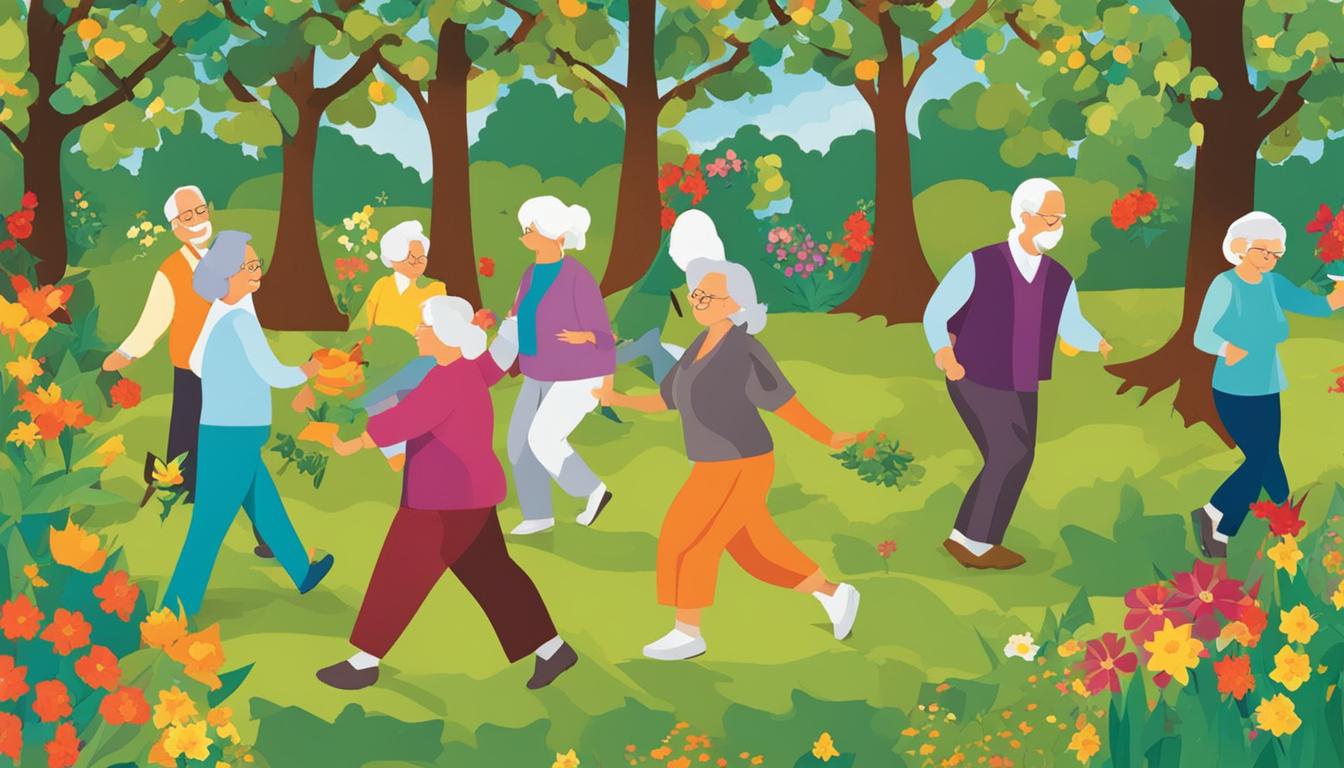Aging is a natural part of life, and while it comes with its challenges, there are ways to age gracefully and maintain vibrant health. In this article, we will explore valuable tips and secrets for healthy aging, so you can enjoy a long and fulfilling life.
As we grow older, it’s important to prioritize our physical, mental, and emotional well-being. By adopting healthy habits and making conscious lifestyle choices, we can age well and minimize the risk of chronic diseases. Let’s dive into the secrets of healthy aging and discover how you can enhance your quality of life.
Key Takeaways:
- Embrace a healthy lifestyle to support healthy aging
- Maintain strong social connections to prevent social isolation and loneliness
- Engage in regular physical activity to promote strength and flexibility
- Prioritize a nutrient-rich diet for optimal health and vitality
- Schedule regular check-ups with your doctor for preventive care
Prevent Social Isolation and Loneliness
Social isolation and loneliness can significantly impact the health and well-being of older adults. It’s important to take proactive steps to prevent these issues and promote healthy aging habits.
The Impact of Social Isolation and Loneliness
Social isolation occurs when individuals have limited social interactions and a lack of meaningful connections with others. Loneliness, on the other hand, is the subjective feeling of being alone and lacking companionship. Both social isolation and loneliness can have detrimental effects on physical and mental health.
- Social isolation and loneliness have been linked to increased risk of chronic conditions such as heart disease, diabetes, and depression.
- Older adults who are socially isolated and lonely are more likely to experience cognitive decline and have a higher risk of developing dementia.
- Maintaining social connections is essential for promoting overall well-being and quality of life.
“Loneliness and the feeling of being unwanted is the most terrible poverty.” – Mother Teresa
To prevent social isolation and loneliness, it is crucial to help older adults stay socially connected. Here are some practical strategies:
- Schedule regular phone calls, video chats, or in-person visits with older adults to maintain communication and connection.
- Encourage participation in community groups, clubs, or organizations that align with their interests and hobbies.
- Provide information about local support resources, such as senior centers, volunteer opportunities, and social events specifically designed for older adults.
By taking these steps, we can create a supportive and connected environment for older adults, promoting healthier aging habits and enhancing their overall well-being.
Promote Physical Activity
Physical activity is a key component of a healthy lifestyle, especially as we age. Engaging in regular exercise can help improve cardiovascular health, maintain muscle strength, enhance flexibility, and even boost mood and cognitive function.
To incorporate physical activity into your daily routine, consider a mix of aerobic exercises, strength training, balance exercises, and flexibility exercises. Aim for at least 150 minutes of moderate-intensity aerobic exercise per week, such as brisk walking or cycling. Additionally, include muscle-strengthening activities, like lifting weights or using resistance bands, at least twice a week.
Here are some ideas to help you stay active:
- Take a daily walk to enjoy the outdoors and increase your cardiovascular fitness.
- Join a fitness class or club that offers activities tailored to older adults, such as yoga or water aerobics.
- Try activities that improve balance and coordination, such as tai chi or dance classes.
- Engage in strength training exercises using weights or resistance bands to maintain muscle mass and bone health.

Benefits of Physical Activity
Regular physical activity offers numerous benefits for older adults. It can help reduce the risk of chronic diseases such as heart disease, stroke, type 2 diabetes, and certain types of cancer. Exercise also helps to manage weight, improve sleep quality, and boost overall energy levels.
Physical activity is not only good for your body but also your mind. Research has shown that exercise can improve cognitive function, memory, and overall mental well-being.
Remember, it’s important to consult with your healthcare provider before starting any new exercise routine, especially if you have any pre-existing health conditions or concerns.
Encourage Healthy Eating

One of the key habits to promote healthy aging is to encourage older adults to adopt a nutritious diet. A well-balanced and healthy diet plays a vital role in maintaining overall health and well-being as we age. By prioritizing healthy eating habits, older adults can optimize their nutrition intake and support their body’s needs.
When it comes to healthy eating, it’s important to emphasize the consumption of fresh fruits and vegetables, which are rich in vitamins, minerals, and antioxidants. Encourage the older adults in your life to incorporate a variety of colorful produce into their meals, such as leafy greens, berries, citrus fruits, and cruciferous vegetables.
In addition to fruits and vegetables, older adults should focus on consuming whole grains, lean proteins, and healthy fats. Whole grains provide essential fiber and nutrients, while lean proteins like poultry, fish, and legumes help maintain muscle mass and support overall health. Healthy fats, found in foods like avocados, nuts, and olive oil, are beneficial for heart health and cognitive function.
Promoting Healthy Eating Habits:
- Go grocery shopping together and discuss the benefits of different food choices.
- Explore ways to modify favorite recipes to make them healthier.
- Encourage meal preparation together to foster a sense of enjoyment and social connection.
“A nutritious diet is the foundation for healthy aging. By encouraging older adults to make healthier food choices and involving them in meal planning and preparation, we can support their overall well-being.”
Schedule Regular Check-ups with a Doctor
When it comes to healthy aging, regular check-ups with a doctor are essential. These routine visits help monitor and maintain overall health, catch potential issues early, and ensure that any existing conditions are properly managed. Encourage your loved ones to communicate openly with their doctors, discuss any concerns or symptoms they may be experiencing, and ask about upcoming appointments or screenings. It’s important to foster a proactive approach to healthcare, and regular check-ups play a crucial role in achieving this.
One of the key benefits of regular check-ups is the opportunity for comprehensive health exams. These exams allow healthcare professionals to assess various aspects of an individual’s health, such as blood pressure, cholesterol levels, and BMI. By regularly monitoring these indicators, doctors can identify any potential risks or areas that may require intervention. Additionally, specific screenings and tests, such as mammograms or colonoscopies, can be scheduled based on age, gender, and medical history, ensuring that potential issues are detected early on.
“Regular health check-ups and screenings are essential for maintaining health and catching potential issues early.”
Another important aspect of regular check-ups is medication management. Older adults may be taking multiple medications to manage chronic conditions. During check-ups, doctors can review the current medication regimen, assess its effectiveness, and make any necessary adjustments. It’s crucial to help your loved ones keep track of their medications and maintain an updated list to share with healthcare providers. This ensures that doctors have a comprehensive view of their medication history and can make informed decisions regarding treatments or potential interactions.
By encouraging regular check-ups with a doctor, you are helping your loved ones prioritize their health and well-being. Remember, prevention and early detection are key to maintaining vibrant health as we age. So, make sure to support and assist them in scheduling and attending these important appointments.
Get Moving
Regular physical exercise is a key component of a healthy aging routine. Engaging in physical activities not only helps maintain strength, flexibility, and balance but also has positive effects on cognitive function and mood. Incorporating a variety of exercises into your daily routine can contribute to overall well-being and enhance mobility.
Consider activities like walking, swimming, strength training, and yoga. Walking is a low-impact exercise that can be easily incorporated into your daily routine. It helps improve cardiovascular health, strengthens muscles, and boosts mood. Swimming is another excellent option as it provides a full-body workout without putting too much stress on joints. Strength training exercises, such as lifting weights or using resistance bands, help build muscle mass and maintain bone density. Finally, practicing yoga improves flexibility, balance, and mindfulness.
Remember to start slowly and gradually increase the intensity and duration of your exercises. It’s essential to listen to your body and consult with a healthcare professional before starting any new exercise program, especially if you have any underlying health conditions. By incorporating regular physical activity into your routine, you can maintain your mobility and enjoy a fulfilling, active lifestyle as you age.

Eat Well
A well-balanced and healthy diet is essential for maintaining overall health and promoting healthy aging habits. By prioritizing nutrient-rich foods, you can provide your body with the necessary vitamins, minerals, and antioxidants to support optimal functioning.
Focus on incorporating a variety of fruits and vegetables into your meals. These colorful foods are packed with essential nutrients and contribute to good health. Opt for whole grains like quinoa, brown rice, and whole wheat bread, which are rich in fiber and provide sustained energy throughout the day.
When choosing protein sources, opt for lean options such as skinless poultry, fish, tofu, and legumes. These foods are low in saturated fats and high in beneficial nutrients. Additionally, include healthy fats in your diet, such as avocados, nuts, and olive oil, which support heart health and provide vital nutrients for brain function.
Here are some tips to help you eat well:
- Plan your meals and snacks ahead of time to ensure you have nutritious options readily available.
- Drink plenty of water throughout the day to stay hydrated and support digestion.
- Avoid or limit processed foods, sugary snacks, and high-sodium foods, as they can contribute to aging-related health issues.
- Enjoy meals in the company of others to enhance social connections and promote overall well-being.
“A healthy diet is the cornerstone of healthy aging. By nourishing your body with nutrient-rich foods, you can support your overall health and well-being.” – Dr. Jane Smith, Nutrition Expert

Remember, small changes in your diet can have a big impact on your health. By making conscious choices and prioritizing nutrient-rich foods, you can support healthy aging and live a vibrant, fulfilling life.
Prioritize Mental and Cognitive Well-being
In order to age in a healthy and fulfilling way, it is essential to prioritize mental and cognitive well-being. Taking care of your mind is just as important as taking care of your body. Here are some key habits to incorporate into your daily routine:
1. Lifelong Learning:
Engage in activities that stimulate your brain and promote continuous learning. This can include reading books, solving puzzles, learning a new language, or taking up a new hobby. Keep your mind active and curious to maintain cognitive health.
2. Social Engagement:
Stay connected with others and maintain a strong support network. Engaging in social activities and spending time with loved ones can help prevent feelings of loneliness and promote emotional well-being. Join clubs, volunteer, or participate in community events to nurture social connections.
3. Stress Management Techniques:
Find healthy ways to manage stress and reduce anxiety. This can include practicing mindfulness, meditation, deep breathing exercises, or engaging in activities that bring you joy and relaxation. Prioritizing stress management can have a positive impact on your mental health.
4. Embrace Change:
As you age, embrace change and approach it with a positive mindset. Life transitions are a part of growing older, and by embracing them, you can foster personal growth and find new opportunities for fulfillment. Stay open to new experiences and focus on what brings you joy in life.

Incorporating these healthy habits into your daily life can contribute to improved mental and cognitive well-being as you age. Remember, small changes can have a big impact, so start taking steps today to prioritize your mental health and ensure a fulfilling and vibrant future.
Embrace Change and Foster Resilience
Embracing change is an essential aspect of healthy aging. Life transitions may bring challenges, but they also present opportunities for personal growth and a fulfilling life. Cultivating emotional resilience is key to navigating these transitions with grace and positivity. Resilience allows individuals to bounce back from setbacks and adapt to new circumstances, promoting overall well-being.
Building Emotional Resilience:
- Practice gratitude: Cultivate a positive mindset by expressing gratitude for the things you appreciate in life. Start a gratitude journal, noting three things you are grateful for each day.
- Stay connected: Maintain strong social ties with loved ones and engage in activities that foster a sense of belonging. Surrounding yourself with a supportive network provides emotional support and helps alleviate feelings of isolation or loneliness.
- Take care of yourself: Prioritize self-care activities that promote mental and emotional well-being. Engage in activities you enjoy, such as hobbies, exercise, or mindfulness practices like meditation or deep breathing.
- Seek support: Don’t hesitate to reach out for professional help if needed. Therapists or counselors can provide guidance and support as you navigate life’s challenges and develop resilience.
“Life is 10% what happens to us and 90% how we react to it.” – Charles R. Swindoll
By embracing change and fostering emotional resilience, older adults can navigate the ups and downs of life with a positive mindset. Remember, it is never too late to start cultivating resilience. With practice and determination, you can develop the skills needed to adapt and thrive in the face of change and challenges. Embrace the opportunities that come your way and approach them with an open heart and mind.

Conclusion
Healthy aging is achievable with the right habits and support. By promoting social connections, engaging in regular physical activity, adopting a nutritious diet, scheduling regular check-ups with a doctor, and prioritizing mental well-being, you can help your loved ones age gracefully and maintain vibrant health as they grow older.
Remember, small behavior changes can have a big impact on overall well-being. Encourage your loved ones to embrace change, foster resilience, and focus on what brings them joy. Help them stay socially connected, engage in physical exercise, and make healthier food choices. Encourage lifelong learning and participation in activities that stimulate the brain. Prioritize mental and cognitive well-being through stress management techniques and embracing new experiences. And don’t forget the importance of regular check-ups and screenings to catch potential health issues early.
By following these healthy aging tips, your loved ones can age gracefully and enjoy a long, fulfilling life. Maintaining vibrant health as you age is within reach, and with your support, they can continue to thrive.
FAQ
What are some tips for healthy aging?
Some tips for healthy aging include staying socially connected, engaging in regular physical activity, maintaining a nutritious diet, and scheduling regular check-ups with a doctor.
How can I prevent social isolation and loneliness as I age?
To prevent social isolation and loneliness, it’s important to stay socially connected by scheduling regular phone calls or video chats, joining groups with shared interests, and utilizing local support resources.
What types of physical activities should I engage in for healthy aging?
For healthy aging, it’s recommended to engage in a mix of activities such as aerobics, strength training, balance exercises, and flexibility exercises. Aim for at least 150 minutes of moderate-intensity aerobic exercise per week and include muscle-strengthening activities at least twice a week.
What should I prioritize in my diet for healthy aging?
To maintain healthy aging, prioritize fresh fruits and vegetables, whole grains, healthy fats, and lean proteins in your diet. Avoid or limit processed foods, sugary snacks, and high-sodium foods.
How often should I schedule check-ups with my doctor for healthy aging?
Regular health check-ups and screenings are essential for maintaining health as you age. It’s recommended to communicate with your doctor, ask about upcoming appointments, and maintain a current list of medications to share with healthcare providers.
What are some examples of physical exercises for healthy aging?
Examples of physical exercises for healthy aging include walking, swimming, strength training, and yoga. These activities not only keep the body fit but also have positive effects on cognitive function and mood.
What should I prioritize in my diet to support healthy aging?
To support healthy aging, prioritize nutrient-rich foods like fruits, vegetables, whole grains, lean proteins, and healthy fats in your diet. Avoid processed foods, sugary snacks, and high-sodium foods as much as possible.
How can I prioritize mental and cognitive well-being as I age?
To prioritize mental and cognitive well-being, engage in lifelong learning, participate in activities that stimulate the brain, and foster emotional well-being through social engagement and stress management techniques.
How can I embrace change and foster resilience for healthy aging?
Embrace change by exploring new interests, setting achievable goals, and focusing on what brings you joy. Cultivating emotional resilience and maintaining a positive mindset can also contribute to healthy aging.
What are some key takeaways for healthy aging?
By promoting social connections, engaging in regular physical activity, maintaining a nutritious diet, scheduling regular check-ups, and prioritizing mental well-being, you can support healthy aging and maintain vibrant health as you grow older. Remember, small behavior changes can have a big impact on overall well-being.


